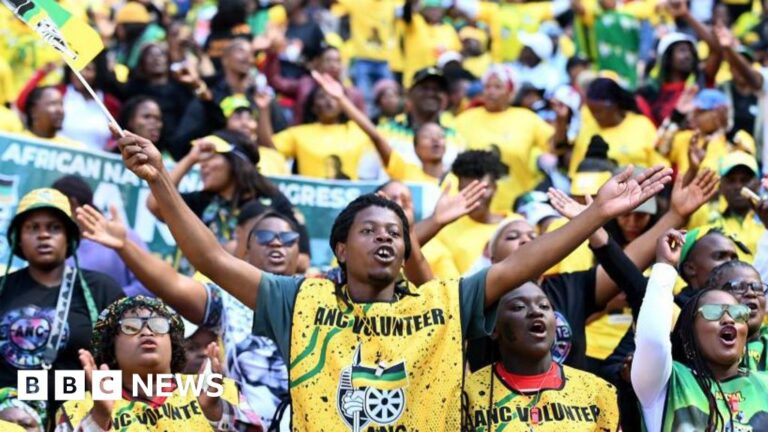Image source, Getty Images
- author, Barbara Plett Usher
- role, BBC Africa Correspondent
- Reported by Cape Town
-
In South Africa, negotiations to form a new government were still ongoing just hours before Parliament was due to meet for the first time since the ruling African National Congress (ANC) lost its majority in last month’s general election.
The ANC says it has made a “breakthrough” towards forming a national unity government, but it is too early to give details.
Solly Malatsi, a spokesman for the main opposition Democratic Alliance party, told the BBC that “major parts” of a framework agreement had been agreed but “we’re not there yet”.
One of Parliament’s first tasks is expected to be to vote by secret ballot on whether Cyril Ramaphosa should remain president.
Although a coalition agreement has yet to be finalised, Ramaphosa is expected to be re-elected.
The ANC won just 40 percent of the vote in the May 29 election, losing its parliamentary majority for the first time in 30 years.
This means Ramaphosa needs the support of other parties to stay in power.
“We are currently in discussions with the political parties,” ANC secretary-general Fikile Mbalula told reporters after a meeting of party leaders on Thursday night, adding that he could not give details.
He said it would be a move to the centre politically, as left-wing ANC breakaway parties have said they will not join a coalition government.
He said political parties, including the pro-business DA, had agreed to form a government of national unity.
But the ANC and DA have not agreed on how exactly they will work together, Mbalula added.
“If the DA gets some of the things it wants, the ANC will be gone,” he said.
The DA came second in the election with 22% of the vote.
“There were still very significant outstanding issues that should have been resolved by the end of the day yesterday,” DA spokesman Malatsi told the BBC’s Newsday programme. [Thursday]However, due to the nature of the negotiations we were conducting, that was not the case.”
The Zulu nationalist Inkatha Freedom Party (IFP), which came in fifth with 4 percent of the vote, has already committed to joining a unity government.
President Ramaphosa has previously denounced the DA, which draws its support mainly from racial minorities, as “treasonous” and “reactionary”.
Any deal with the DA would be unpopular among many ANC activists.
The party advocates free market economics, which is at odds with the ANC’s left-wing traditions and is seen by critics as representing the interests of the white minority.
The ANC is calling its coalition the Government of National Unity (GNU) but has been unable to get the third and fourth largest parties, former president Jacob Zuma’s Umkhonto weSizwe (MK) party and Julius Malema’s Economic Freedom Fighters (EFF) party to join.
The prime minister had made Ramaphosa’s resignation one of the conditions for forming a coalition government, but the ANC rejected the demand.
On Thursday evening, Malema said the EFF refused to take part in a government including the DA, saying it was part of an “imperialist project”.
Both MK and the EFF also called for constitutional reform to allow for the nationalisation of white-owned land, including banks.
President Ramaphosa disagreed, saying the ANC would not form a coalition with parties that wanted to reform the constitution.

